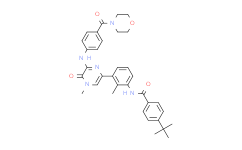| Description: |
CGI-1746 is a potent and highly selective inhibitor of the Btk with IC50 of 1.9 nM. |
| In Vivo: |
CGI1746 abrogates B cell-dependent arthritis. CGI1746 treatment (100 mg/kg, s.c, twice-daily dosing) results in significant inhibition (97%) of overall clinical arthritis scores. CGI1746 treatment substantially reduces TNFα, IL-1β and IL-6, as well as MCP1 and MIP-1α on both the mRNA and protein level in the passive anti-collagen II antibody-induced arthritis (CAIA) model. CGI1746 shows comparable efficacy to TNFα blockade and significantly reduces clinical scores, as well as joint inflammation, in mice or rats with established arthritis[1]. |
| In Vitro: |
CGI1746 is specific for Btk, with appr 1,000-fold selectivity over Tec and Src family kinases. In an ATP-free competition binding assay, the dissociation constant for Btk is 1.5 nM. CGI1746 inhibits Btk activity in a new binding mode that stabilizes an inactive nonphosphorylated enzyme conformation. CGI1746 inhibits both auto- and transphosphorylation steps necessary for enzyme activation. CGI1746 completely inhibits anti-IgM-induced murine and human B cell proliferation, with IC50s of 134 nM and 42 nM, respectively, but has no effect on anti-CD3- and anti-CD28-induced T cell proliferation. CGI1746 potently inhibits the proliferation of CD27+IgG+ B cells isolated from the tonsils of four human donors with an average IC50 of 112 nM. In macrophages, CGI1746 abolishes FcγRIII-induced TNFα, IL-1β and IL-6 production. CGI1746 potently inhibits TNFα, IL-1β and, to a lesser extent, IL-6 (three- to eight-fold higher IC50) production in human monocytes stimulated with immobilized or soluble immune complexes[1]. CGI-1746 does not kill cells as well as the irreversible BTK inhibitors at the same drug concentration. CGI-1746 significantly reduces phosphorylation of both the BTK-A and BTK-C proteins, indicating the auto-phosphorylation of the BTK-C isoform is inhibited in a manner similar to BTK-A. CGI-1746 does not kill LNCaP or DU145 prostate cancer cells at the same concentrations as Ibrutinib or AVL-292, but it demonstrates similar inhibition of BTK phosphorylation at tyrosine 233 in the SH3 domain[2]. |
| Cell Assay: |
5×103 DU145 cells or 104 LNCaP cells per well, grown on 96 well plates for 24h, are treated with 1 to 30 µM BTK inhibitors. Cells are fixed after 72h with 2.5% formaldehyde, and stained with Hoechst 33342. Control cells are treated with DMSO. Cell images are acquired using an IN Cell Analyzer 2200 high content imaging system, with a 20X objective. At least 9 fields are imaged per single well of each experiment. Cell numbers are determined and statistics performed using IN Cell Investigator 3.4 high content image analysis software. Each experiment is replicated 3 times, and data are presented as mean±SD. Results are considered significant if p < 0.05. |
| References: |
[1]. Di Paolo, Julie A. et al. Specific Btk inhibition suppresses B cell- and myeloid cell-mediated arthritis. Nature Chemical Biology (2011), 7(1), 41-50
[2]. Kokabee L, et al. Bruton's tyrosine kinase is a potential therapeutic target in prostate cancer. Cancer Biol Ther. 2015;16(11):1604-15. |






















